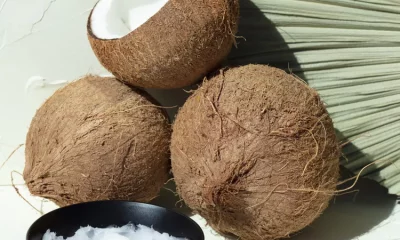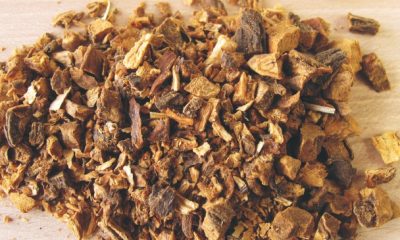Health
8 benefits of ginger juice

Table of Contents
Discover the 8 benefits of ginger juice.
The properties of ginger juice for health are innumerable since ginger provides benefits to the body in multiple ways and offers a boost to the immune system, in addition to contributing vitamins and minerals among other great benefits.
Making ginger juice is very easy and practical. Learn how to make it to take daily and keep diseases at bay by following the instructions below
With its spicy flavor and exotic aroma, ginger can be associated with Thai curry mixes or fried foods typical of traditional Southeast Asian cuisine.
As if this were not enough, it is now known that ginger is a very good nutritional source that when reduced to juice and added to regular vegetable or fruit smoothies, is capable of increasing the nutrient content while incorporating a rich spicy touch.
Pure ginger juice is too bitter and pungent to consume on its own, so try mixing it with juice from fresh apples or carrots. 250 grams of ginger root are needed to prepare 2 ounces of fresh ginger juice.
Combining ginger with lemon gives it detoxifying power . You can try several combinations to find your flavor or vary.
Nutrients provided by ginger juice
Potassium
Potassium is an essential mineral and electrolyte that contributes to building muscle and protein. It helps maintain the electrical activity of the heart, regulates your body’s acid-base balance, and breaks down carbohydrates into usable energy.
A 2-ounce serving of ginger juice contains 1,038 milligrams of potassium, which is 22% of the recommended daily intake for adults.
niacin
One of the members of the B vitamin complex is niacin, which is also known as vitamin B-3. As with all B vitamins, niacin is involved in keeping your skin, hair, eyes, and liver healthy.
It also contributes to the processing of fats and proteins and supports the nervous and immune systems.
Niacin allows the body to produce anti-stress hormones, not to mention that it improves blood circulation. A 2-ounce serving of ginger juice contains about 2 milligrams of niacin.
This is nearly 12.5% of the RDA for adult men, 14% of the RDA for adult women, and nearly 11% of the RDA for pregnant and lactating women.
Phosphorus
Phosphorus is found in every cell of your body, although most of it is concentrated in the bones and teeth, as it provides strength and is involved in their construction. Phosphorus is an essential mineral that helps the body break down carbohydrates and fats.
It also acts in the production and maintenance of cells and tissues. A 2-ounce serving of fresh ginger juice contains just over 12% of the recommended daily intake of phosphorus for adults (this equates to 85 milligrams of phosphorus per serving).
Vitamin C
A natural antioxidant, vitamin C is the ingredient that allows cells to defend themselves against free radicals and environmental toxins, which can cause premature aging and cell death.
Vitamin C also plays an important role in the production of collagen, which is used to repair and produce tendons, cartilage, bones, ligaments, and blood vessels. A 2-ounce serving of ginger juice contains 12.5 milligrams of vitamin C.
This is almost 14% of the Dietary Reference Intake or DRI for adult men, as well as just over 16% of the DRI for adult women, almost 15 percent of the DRI for pregnant women, and 10% of the DRI for women who are breastfeeding.
Benefits of ginger juice
1.- Boosts the immune system. And it keeps you further away from colds and flu, plus it’s a natural antibiotic.
- Ginger juice prevents cancer. Studies have shown that ginger is effective in treating cancer, especially preventive in ovarian cancer.
- For patients with Irritable Bowel Syndrome. Helps calm irritable bowel symptoms.
- Against Alzheimer’s. Consuming ginger daily helps slow down the death of brain cells.
- Stimulates the appetite. Ginger stimulates appetite and can also suppress it, making you feel full at times, which contributes to weight loss.
- For tired muscles. It can help muscles recover faster and more efficiently after exercise.
- Keep blood glucose in balance. Reduces high blood glucose levels.
- Helps lose belly fat. Ginger is extremely helpful in losing extra weight in a very short time and is even more effective than numerous drugs and supplements offered on the market which are loaded with chemicals.
Drink this juice daily. For fast effects of losing excess fat, drink daily for 6 months.
Benefits of ginger juice for arthritis and osteoporosis
Ginger juice has positive effects on osteoarthritis and rheumatoid arthritis, due to its high content of gingerol, a natural anti-inflammatory compound that inhibits the production of a nitrogen molecule called nitric oxide, which can form peroxynitrite, a powerful free radical and detrimental to health, plus ginger juice is effective in relieving morning stiffness.
Fresh ginger is a popular marinade as it contains enzymes that help tenderize meat by breaking down its proteins. While some of the marinade recipes use minced or grated ginger, others call for freshly squeezed ginger juice.
In addition to marinades, ginger juice is also used to flavor sauces.
How to make ginger juice
Ingredients
•fresh ginger
•Grater or juicer
•cheese cloth
•Container to collect the juice
There are two ways you can extract ginger juice. It can be through the grater or a juicer.
Instructions
•Take some ginger and rinse thoroughly. Now she begins to peel off the skin. If the ginger is fresh it will be quite easy to peel it. You can even peel with a teaspoon. Peeling is not required. It’s your choice.
•Take the ginger pieces and grate them using the grater with the smallest holes. The grater should fit the edge. This will make your work easy and comfortable.
•Scoop up all the grated ginger and place it in the center of the cheesecloth. Wrap up the gauze properly.
•Now squeeze the ginger into the cloth or you can also twist the cheesecloth until the ginger juice starts to come out.
•Crush it or twist it harder to extract more juice. Make sure you have a container handy to collect the juice.
•Once the maximum ginger juice has been extracted, then the cheesecloth can be opened to remove the dried grated ginger.
•The juice collected in the container is the ginger juice you want.
•Nothing goes in the trash. Even the dried grated ginger obtained can also be used for making dishes, tea, or any personal use.
•This dried ginger obtained will not be as strong as fresh ginger, since you have extracted the juice from it. But even so, the essence remains.
Ginger juice using a mixer
The process remains the same. Here you put the ginger pieces with a small amount of water in the blender. It is mixed for a few minutes.
Once you have finished, put everything on the cheesecloth, taking care to do everything on a container already prepared so as not to waste the juice that has already been made.
Squeeze and twist the cloth so that the ginger juice can be collected over the container.
The dried ginger that remains after juicing can be reused as discussed above.
How to take ginger juice
Ginger juice can be a bit spicy if you are not used to it. You can add a little honey to take it by adding a little more water to further neutralize the flavor and make it lighter.
You can also make something more complete by adding apple juice, orange juice, or any other vegetable juice, for example, cucumber juice, carrot juice, celery juice, or a combination of all of them. To do this, you can pass the ginger directly through the extractor when you are extracting the juice from the other fruits or vegetables.
The result will be something delicious and you can’t imagine how healing! Take it in the morning on an empty stomach and you will take advantage of all its benefits.
Health
10 shocking health benefits of rosemary tea

Table of Contents
Health
Benefits of fasting for 24 hours

Discover the benefits of fasting for 24 hours.
24-hour intermittent fasting is often recommended for weight loss, but also its many health benefits.
In this article, I detail the benefits of intermittent fasting, and particularly its practice over 24 hours. You will also be able to find my testimonial and my advice for a successful 24-hour intermittent fasting.
24hr Intermittent fasting to live longer in good health!
This sentence comes up constantly when one is interested in the subject. Simple fashion effect or real health interest? That’s the real question.
The objective of this practice is based on calorie restriction and resting the digestive system as a whole.
When we eat too much, binge, and get too much protein, our aging process is accelerated. Our body ages faster. To counter this effect, it is, therefore, necessary to fast. You boost your production of growth hormone, a hormone of youth.
In practice, it remains very complicated. It was Dr. Valter Longo who simplified the practice of intermittent fasting to reap all the health benefits. But in reality, is it effective?
The benefits of 24 hours intermittent fasting
Many scientific studies have highlighted the following health benefits of intermittent fasting:
• Promote weight loss, maintenance, lower bad cholesterol and increase well.
• Reduce cardiovascular and cancer risks.
• Regulate blood sugar by lowering insulin production and increasing fat metabolism.
• Lower the markers of inflammation ( responsible for the aging process ).
• Stimulate growth hormone production ( 2000% during 24-hour intermittent fasting ). This molecule helps you fight to age, tap into your fat and increase your muscle mass.
• Regulate hormonal disturbances after meals.
• Diversify the composition of the intestinal flora.
• Improve the quality of sleep.
It should be noted that these benefits are mainly found in a population that is overweight or obese, sedentary, or suffering from metabolic disease. The effects of intermittent fasting in healthy, physically active, or athletic people seem small to non-existent.
Intermittent fasting and weight loss
According to scientific research, intermittent fasting is effective for weight loss.
The main reason for the effectiveness of intermittent fasting on weight loss is calorie restriction.
Indeed, skipping one or more meals considerably reduces your food consumption. You then find yourself in an energy deficit, and your body has no choice but to draw on the stock of glycogen and fats to continue to function.
Practiced 1 to 2 times a week, over 3 to 24 weeks, intermittent fasting can lead to a weight loss of 3 to 8% of the initial weight, with a non-negligible share of abdominal fat (reduction in the circumference of cut).
However, over the long term, the evidence on the effectiveness of intermittent fasting remains very weak. We don’t know if, as with all low-calorie diets, it leads to a Yoyo effect and significant regain of lost pounds.
To lose weight permanently, mainly fat, while maintaining your muscle mass, it is advisable to combine a slight caloric restriction and the practice of sport regularly.
Need to lose weight permanently?
My Sport to lose weight program has already enabled hundreds of people to lose weight, improve their health and be in better shape! It includes sports sessions in videos, tools to calculate your fat loss, tips for starting running, recipes, and much more… It’s never too late to start the sport and lose weight for your health.
Opinion on the intermittent fasting 24h
So I wanted to get to the bottom of it and test this practice. To simplify things, Dr. Longo has been testing different protocols for several years. Simpler protocols to apply daily while maintaining the benefits. For people with a healthy lifestyle, practicing 24 hours a month is very effective.
So I fasted for 24 hours. The easiest way is to start after dinner. You eat dinner normally, then nothing until dinner the next day. Hydrate well. You can also consume tea, coffee, infusions but without sugar.
I was afraid of being too hungry, of being a wreck unable to move. And not at all. I did my intermittent fast one day back from vacation, in the car. I felt good, without a stroke. What a pleasure to sit down to eat in the evening, even if the goal is to eat normally and no more than usual.
I resumed the sport the next day with a big day ( 3h30 of cycling chained to 1h of jogging ). I felt good, I didn’t have any cravings. I even recovered better. I am full faster on the meals that follow. The results are very positive.
However, here are some tips to guide you:
• No sport on the day of intermittent fasting, or a short cardio session (30 minutes).
• Take care. Get out of your house, otherwise, the day will be too long to manage unless you have plenty of tasks to accomplish.
• Don’t throw yourself on the food when you eat again. Don’t say to yourself: “it’s good, I’ve done the hardest I can let go”.
• Remember to drink well ( 1.5 to 2 liters of water ) and take hot drinks for satiety.
Be careful if you have medical treatment, do not do it. I do not know the actions of this practice under these conditions. A drug does not have the same effect in these conditions, so check with your doctor.
I await your reactions after your tests. Intermittent fasting is increasingly practiced in the United States, to fight against junk food and diseases of civilization. Its health benefits are undeniable. Live old and above all live better!
Health
Benefits of hibiscus tea for skin

Table of Contents
- Benefits of hibiscus tea for skin
- Greater elasticity in the skin
- Prevents and fights cell damage
- Hydrates in depth
- Unifies skin tone
- Discover the benefits of hibiscus tea for skin.In today’s post we want to offer you a wonderful option to enhance your health and even take care of your beauty with a gift from nature whose qualities have been known for thousands of years.
We want to talk about the Hibiscus tea, a plant native to China and Japan, also known as China rose, whose extract has a wide range of properties, among which are antiseptic, digestive, diuretic, and others that we will detail below.
Its cosmetic properties are so amazing that it has been called “vegetable Botox”, rich in antioxidants and vitamin C.
Its effects after constant consumption in the form of an infusion, for example, have been compared to the effects of Botox injections, since its tightening effect helps to hide expression lines and sagging of the face.
Its active components act at the cellular level, nourishing and moisturizing the dermis, creating a wonderful anti-aging effect.
There are 5 different varieties of Hibiscus in the world: Hibiscus Rosa Sinensis, the best known in Spain, Hibiscus esculentus, Hibiscus sabdariffa, and Hibiscus tiliaceous.
Its flower is edible and its different forms of presentation, in powder, in preparation for infusion, or syrup, allow us to take it comfortably and prepare masks that will surely become great allies for your skin and hair.
In India, hibiscus has traditionally been used to treat hair problems, reduce dandruff, moisturize the scalp while nourishing and strengthening it, and even prevent the appearance of gray hair.
Benefits of hibiscus tea for skin
Greater elasticity in the skin
As we have previously mentioned, the Hibiscus tea will provide us with its tensor effect, greater elasticity, and firmness in the skin, keeping it looking young for longer.
Prevents and fights cell damage
Hibiscus tea fights free radicals that cause oxidation that starts the aging process in the skin, the largest and heaviest organ in the body.
Hydrates in depth
After using the usual cleansers we remove the moisture and natural agents that protect our skin, if we regularly use hibiscus masks we will ensure that our facial skin is sufficiently hydrated avoiding dryness and its unwanted consequences.
Unifies skin tone
Hibiscus is known for its exfoliating and anti-blemish action and its beneficial effects in cases of hyperpigmentation, unifying the tone and softening the features.
For all these benefits, the Hibiscus tea is considered a natural and effective anti-aging recipe, do not forget to try it.
Related Searches…
Hibiscus tea for skin whitening
Hibiscus tea benefits hair
How to make hibiscus tea
Benefits of hibiscus for lips
Hibiscus for skin tightening
How to use hibiscus for acne
Benefits of hibiscus oil for skin
Hibiscus flower benefits for hair and skin
Hibiscus tea effect on kidneys
Hibiscus powder benefits
Homemade hibiscus face cream
Hibiscus soap benefits for skin
-

 Benefits4 months ago
Benefits4 months agoThe Benefits of Joining Gym Lumolog – Improve Your Fitness & Health
-

 Food1 year ago
Food1 year ago10 + Benefits of carrot juice and side effects
-

 Health1 year ago
Health1 year ago50 Super Healthy (And Very Often Cheap) Foods
-

 Health1 year ago
Health1 year ago5 Shocking health benefits of kinkeliba and side effects
-

 Health1 year ago
Health1 year ago15 health benefits of soursop leaves tea and side effects
-

 Food1 year ago
Food1 year ago8 shocking benefits of leek juice and side effects
-

 Health1 year ago
Health1 year ago15 Benefits of lipton tea and side effects
-

 Health1 year ago
Health1 year agoBenefits of guava leaves Sensually












